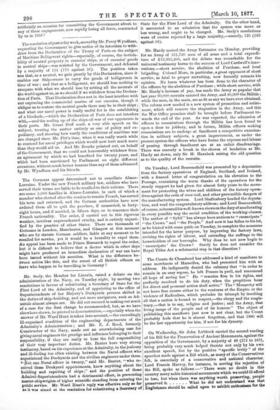Mr. Seely, the Member for Lincoln, raised a debate on
the administration of the Navy, on Tuesday night, by moving two resolutions in favour of substituting a Secretary of State for the First Lord of the Admiralty, and of appointing to the offiee of Superintendents of her Majesty's Dockyards persons skilled in the duties of ship-building, and not mere navigators, such as Ad- mirals almost always are. He did not succeed in making out much of a case for the first change he recommended, but, as we have elsewhere shown, he proved to demonstration,—especially when the answer of Mr. Ward Hunt is taken into account,—the exceedingly ill-organised condition of the engineering departments of the Admiralty's Administration ; and Mr. E. J. Reed, formerly Constructor of the Navy, made out an overwhelming case for giving naval engineers the prestige and influence belonging to their responsibility, if they are really to bear the full responsibility of their vezy important duties. Mr. Baxter bore very strong testimony, based on his experience at the Admiralty, to the jealousy and ill-feeling too often existing between the Naval officers who superintend the Dockyards and the civilian engineers under them. "Not one Naval officer in twenty," said Mr. Baxter, "who re- ceived these Dockyard appointments, knew anything about the building and repairing of ships ;" and the position of these Admiral-Superintendents had a detrimental effect, in preventing master-shipwrights of higher scientific standing from entering the public service. Mr. Ward Hunt's reply was effective only so fer U it was aimed at the resolution for substituting a Secretary of State for the First Lord of the Admiralty. On the other hand, it amounted to an admission that the system was more or less wrong, and ought to be changed. Mr. Seely's resolutions were of course rejected by a large majority,—namely, 125 (18S against 58).


































 Previous page
Previous page